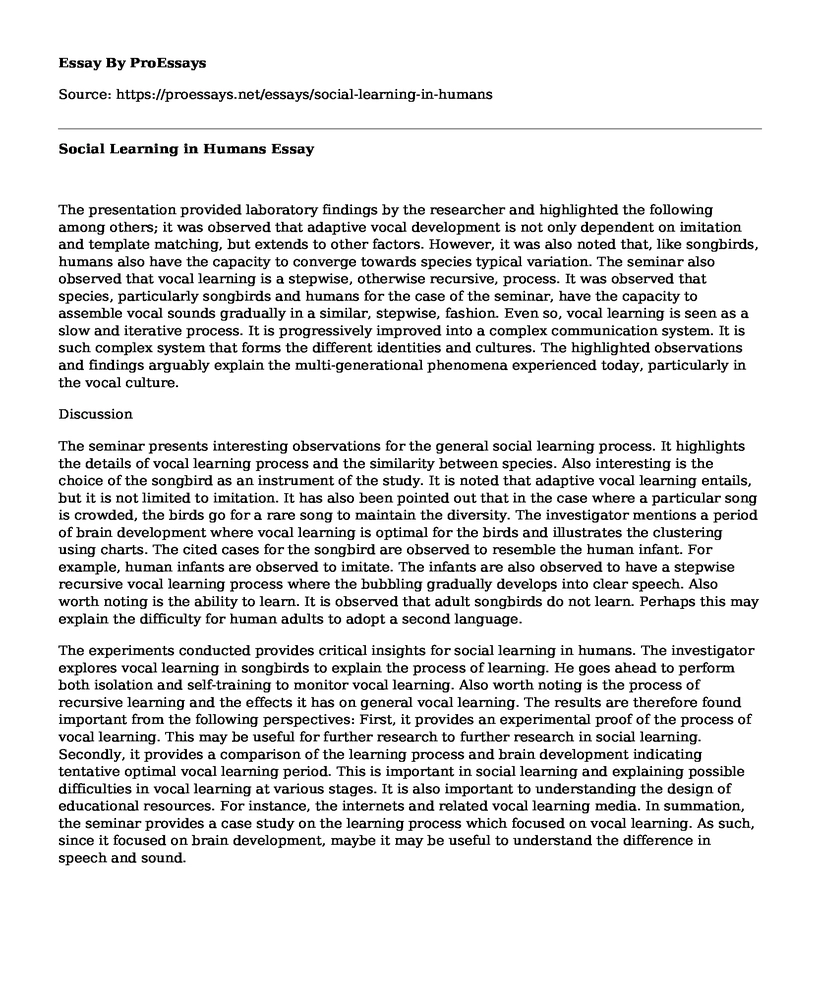The presentation provided laboratory findings by the researcher and highlighted the following among others; it was observed that adaptive vocal development is not only dependent on imitation and template matching, but extends to other factors. However, it was also noted that, like songbirds, humans also have the capacity to converge towards species typical variation. The seminar also observed that vocal learning is a stepwise, otherwise recursive, process. It was observed that species, particularly songbirds and humans for the case of the seminar, have the capacity to assemble vocal sounds gradually in a similar, stepwise, fashion. Even so, vocal learning is seen as a slow and iterative process. It is progressively improved into a complex communication system. It is such complex system that forms the different identities and cultures. The highlighted observations and findings arguably explain the multi-generational phenomena experienced today, particularly in the vocal culture.
Discussion
The seminar presents interesting observations for the general social learning process. It highlights the details of vocal learning process and the similarity between species. Also interesting is the choice of the songbird as an instrument of the study. It is noted that adaptive vocal learning entails, but it is not limited to imitation. It has also been pointed out that in the case where a particular song is crowded, the birds go for a rare song to maintain the diversity. The investigator mentions a period of brain development where vocal learning is optimal for the birds and illustrates the clustering using charts. The cited cases for the songbird are observed to resemble the human infant. For example, human infants are observed to imitate. The infants are also observed to have a stepwise recursive vocal learning process where the bubbling gradually develops into clear speech. Also worth noting is the ability to learn. It is observed that adult songbirds do not learn. Perhaps this may explain the difficulty for human adults to adopt a second language.
The experiments conducted provides critical insights for social learning in humans. The investigator explores vocal learning in songbirds to explain the process of learning. He goes ahead to perform both isolation and self-training to monitor vocal learning. Also worth noting is the process of recursive learning and the effects it has on general vocal learning. The results are therefore found important from the following perspectives: First, it provides an experimental proof of the process of vocal learning. This may be useful for further research to further research in social learning. Secondly, it provides a comparison of the learning process and brain development indicating tentative optimal vocal learning period. This is important in social learning and explaining possible difficulties in vocal learning at various stages. It is also important to understanding the design of educational resources. For instance, the internets and related vocal learning media. In summation, the seminar provides a case study on the learning process which focused on vocal learning. As such, since it focused on brain development, maybe it may be useful to understand the difference in speech and sound.
Cite this page
Social Learning in Humans. (2021, Mar 15). Retrieved from https://proessays.net/essays/social-learning-in-humans
If you are the original author of this essay and no longer wish to have it published on the ProEssays website, please click below to request its removal:
- The Impact of Family Involvement on the Education of Children
- Educator Preparation Reflection Essay
- Rental Properties and Government Fight Against Same-Sex Marriage in Canada and Bermuda
- Essay Sample on Early Childhood Education: Ideal Classroom
- Critical Thinking: Complexity Linked to Understanding the Facets of Subjective Well-Being
- Essay Example on Fairtrade Social Movement: Securing a Better Future for Coffee Farmers
- Essay Example on Movies in Film Class







